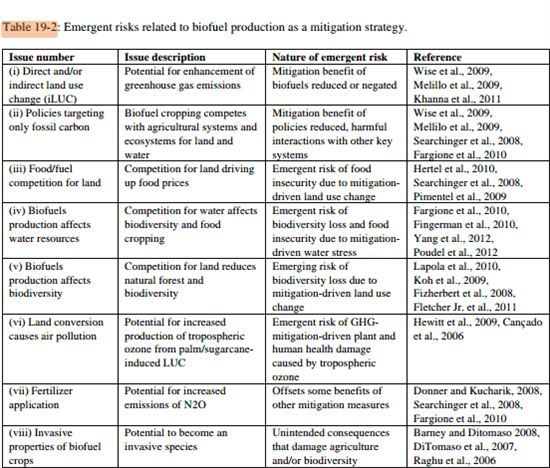Robin Webster
26.03.2014 | 11:15amThe Intergovernmental Panel on Climate Change (IPCC)’s new report, due to be launched next week, is likely to give a new and updated perspective on biofuels – reflecting a flood of research on their impact on natural systems in past years.
The UN-created body launched its last major report back in 2007. At that time, the idea of using plant based crops as a replacement for fossil fuels was largely viewed as an effective way of reducing greenhouse gas emissions from the transport sector.
But soon after, studies began emerging in the scientific literature that challenged this idea. They suggested biofuels could damage the environment, drive up food prices, or even increase greenhouse gas emissions.
Biofuels in the the IPCC’s Fourth Assessment
Back in 2007, the IPCC identified transport biofuels as a “key mitigation strategy”. They “might” play an important role in addressing greenhouse gas emissions in the transport sector, it said.
The potential for reducing greenhouse gas emissions through crop-based biofuels was however “very large but uncertain”, according to its report. Calculating the emissions associated with growing different crops, processing them, and using the product as fuel were “very complex”, with many uncertainties.
Overall, the IPCC projected that biofuels could account for three per cent of transport energy demand in 2030, and this could increase to about five to 10 per cent thereafter.
A volume of evidence
Evidence on the risks associated with biofuel production began emerging soon after the last IPCC report was published in 2007, however. The next IPCC report on the impacts of climate change, due to be launched next Monday, will include an assessment of what’s changed.
A draft version of report leaked onto the internet summarises the ’emergent risks’ associated with biofuel production:
One of the key issues is the potential for biofuel to use up more land. The draft report has “high confidence” that the conversion of previously uncultivated or non-degraded land into bioenergy plantations “will lead to negative impacts on ecosystems and biodiversity”.
A significant expansion of growing biofuels around the world has the potential to increase the rate at which the world’s forests are being cut down, research shows. In one of the future scenarios the IPCC has put together, a large expansion of biofuel production leads to more destruction of natural forests.
Even if the crops are planted on previously cultivated land, that could indirectly cause virgin rainforest or other natural systems to be converted to agriculture. That’s because they would force farmers to look elsewhere for places to grow food crops – a process known as indirect land use change.
Reductions in greenhouse gas emissions from using biofuels instead of fossil fuels “may be offset partly or entirely for decades or centuries” as a result of indirect land use change or the conversion of peat forests to agriculture, the leaked report says.
Increasing competition for land around the world could also decrease food security, and increase food prices in already vulnerable regions. Isolating biofuels’ exact contributions to food-system changes have proven difficult, the IPCC says. But it has “high confidence” that pressure on land use for biofuels will further increase food prices.
The IPCC weighs it up
Overall, the summary of the draft report concludes:
“… increasing bioenergy crop cultivation poses risks to ecosystems and biodiversity, although contributions of biomass energy to mitigation reduce climate-related risks (high confidence).”
The Sunday Telegraph notes the change, interpreting the first half of this sentence as a “dramatic U-turn” on the IPCC’s previous position. It says the report will “[condemn] the widespread use of biofuels made from crops as a replacement for petrol and diesel”, concluding that widespread expansion of biofuels will “do more harm than good”.
Yesterday, working group II author and head of the Walker Institute for climate change research at Reading University Professor Nigel Arnell responded to this, telling journalists:
“The IPCC doesn’t have an opinion on whether biofuels are good or bad â?¦ [what the report will do is] assess the evidence on whether biofuels will have an impact on food production, for example.”
The IPCC is interesting because doesn’t produce new scientific research or adopt policy positions. Rather, it’s the IPCC’s job to summarise all the new scientific evidence that has emerged, and synthesise scientific research into summary reports, to try and give a best assessment of what’s going on.
The leaked drafts suggest the IPCC is not likely to ‘condemn’ biofuels wholesale. Next week’s report is likely to suggest that growing crops to generate energy or power transport systems – particularly on a large scale – could damage ecosystems and biodiversity around the world, impact on food prices and could – in some circumstances – even drive up emissions.
But it will also say that using crops, plants or trees instead of fossil fuels to generate energy has the potential to reduce greenhouse gas emissions in the right situation. And this could include using crops to create transport fuels.


